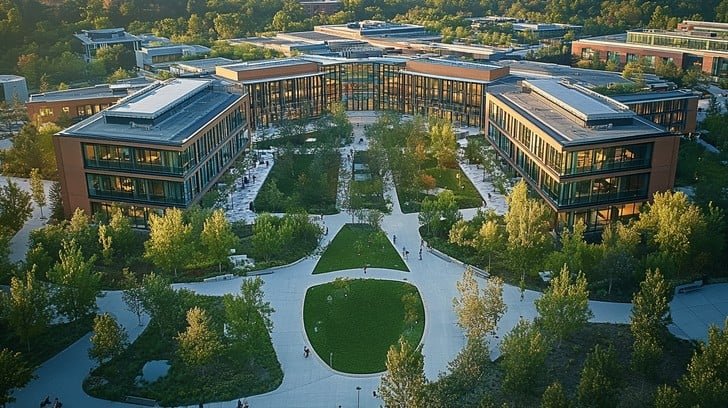As climate change becomes an increasingly pressing global issue, educational institutions worldwide are stepping up their efforts to create sustainable environments that not only provide a better future for students but also set an example for communities and industries to follow. Universities, with their large campuses, significant resources, and substantial student bodies, are in a unique position to influence change and promote sustainability. By adopting and championing green initiatives, university campus can contribute to global environmental conservation, while fostering eco-conscious students and future leaders who are dedicated to creating a more sustainable world.
This article explores how university campuses can promote sustainability and green initiatives, from energy-efficient infrastructure and waste management to sustainable food practices and community involvement. Let’s dive into the various aspects of promoting sustainability in the university setting and look at how these initiatives can be implemented effectively.
Key Takeaways
- Campus Sustainability Promotes Environmental Stewardship: Universities can reduce their ecological footprint through green building initiatives, renewable energy, and waste reduction programs.
- Students Play a Crucial Role: Engagement through sustainability clubs, awareness campaigns, and day-to-day actions can make a significant difference in a university’s environmental impact.
- Waste Reduction and Recycling Programs Are Vital: Effective recycling, composting, and zero-waste initiatives can help universities minimize their waste and reduce their reliance on landfills.
- Sustainability Is a Community Effort: Partnerships with local organizations, businesses, and the community help extend sustainability beyond campus boundaries.
- Sustainability Creates Long-Term Financial Benefits: Implementing green initiatives, such as energy efficiency and water conservation, reduces long-term costs and helps ensure the university’s future sustainability.
The Importance of Sustainability on University Campus
Sustainability encompasses efforts to protect the environment, conserve resources, and reduce the human ecological footprint. On a university campus, sustainability is more than just reducing waste or lowering energy consumption—it’s about building an eco-conscious community that actively engages with sustainability practices in every aspect of campus life.
Promoting sustainability at universities helps students, faculty, and staff make informed decisions about their environmental impact, while also ensuring that the institution’s operations align with environmental, social, and economic considerations. Implementing sustainable practices on university campuses also ensures the long-term viability of resources and helps reduce the costs associated with energy, water, and waste management.
Key Areas for Promoting Sustainability on University Campuses
Here are some critical areas where universities can promote sustainability and green initiatives effectively:
1. Sustainable University Campus Design and Infrastructure

- Green Building Standards: New university buildings and campus renovations should be designed and constructed according to green building standards such as LEED (Leadership in Energy and Environmental Design). This includes using energy-efficient materials, implementing water-saving technologies, and reducing the carbon footprint of the construction process.
- Renewable Energy: Universities can integrate renewable energy sources such as solar panels, wind turbines, or geothermal energy into their campus infrastructure. Solar energy systems, for example, can power campus facilities and reduce reliance on non-renewable energy sources.
- Energy-efficient Lighting: Switching to energy-efficient lighting, such as LED bulbs, across the campus can significantly reduce electricity consumption. Installing motion-sensor lighting in dormitories, classrooms, and hallways can further reduce energy waste.
2. Waste Reduction and Recycling Programs
- Zero Waste Initiatives: A zero-waste goal focuses on eliminating waste sent to landfills by reusing, recycling, or composting materials. University campuses can encourage students and faculty to reduce waste through proper sorting and recycling initiatives.
- Composting: Campuses can introduce composting programs in dining halls and encourage students to compost food waste. Composting not only reduces landfill waste but also enriches the soil for on-campus gardens.
- E-waste Recycling: Universities can establish e-waste recycling programs for old electronics like computers, phones, and printers, ensuring these items are properly disposed of and recycled.
3. Sustainable Transportation
- Bike-Friendly Campuses: Encourage students and staff to use bicycles as a means of transportation on campus by providing bike racks, bike-sharing programs, and designated bike lanes.
- Electric Vehicles and Charging Stations: Universities can promote the use of electric vehicles (EVs) by installing EV charging stations on campus. This provides an environmentally friendly transportation option for students, faculty, and staff.
- Public Transportation and Carpooling: Many universities offer discounted or free public transportation passes to students. Promoting carpooling and shared rides can also help reduce the number of vehicles on campus and decrease carbon emissions.
4. Sustainable Food Practices
- Local and Organic Food Options: University dining services can support local farmers by sourcing organic, seasonal, and locally grown produce for meal preparation. This reduces the carbon footprint associated with transporting food over long distances.
- Meatless Monday Initiatives: Reducing meat consumption is a key aspect of promoting sustainability. Some universities participate in initiatives like “Meatless Mondays,” where students are encouraged to avoid meat for one day each week.
- Food Waste Reduction: Universities can partner with local food banks or organizations to donate excess food and ensure it doesn’t go to waste. Implementing smaller portion sizes and educating students on food waste reduction also plays a vital role.
5. Environmental Education and Awareness

- Sustainability Workshops and Programs: Universities can offer sustainability-related workshops, seminars, and events that educate students on the importance of reducing their environmental impact. Guest speakers from green organizations, sustainability experts, and environmental activists can provide valuable insights.
- Sustainability Clubs and Student Initiatives: Many campuses have sustainability or environmental clubs where students can take part in hands-on projects such as tree planting, community cleanups, or awareness campaigns. Encouraging these grassroots initiatives empowers students to make a difference.
- Sustainable Curriculum Integration: Universities can incorporate sustainability topics into the curriculum across various departments. Offering courses on environmental science, green technology, or social sustainability helps prepare students for careers in sustainability fields.
6. Water Conservation Initiatives
- Water-saving Technologies: Installing low-flow faucets, water-efficient toilets, and irrigation systems can drastically reduce water consumption on campus. Smart irrigation systems can help conserve water by adjusting watering schedules based on weather conditions.
- Rainwater Harvesting: Universities can implement rainwater harvesting systems to collect and store rainwater for non-potable uses such as irrigation, cooling, and cleaning. This reduces the demand on municipal water systems.
7. Green Campus Partnerships and Community Engagement
- Partnerships with Green Organizations: Universities can collaborate with environmental organizations and other sustainability-focused entities to advance their green initiatives and learn best practices from industry leaders.
- Community Outreach Programs: Engaging local communities in sustainability efforts, such as organizing neighborhood cleanups, tree-planting campaigns, or sustainable gardening projects, can extend the university’s sustainability impact beyond campus borders.
8. Green Energy and Smart Grid Integration
- Smart Grid Technology: Smart grid systems can enhance the university’s energy management by integrating renewable energy sources, improving energy distribution, and optimizing energy consumption patterns on campus. Universities can monitor energy usage in real-time and make data-driven decisions to reduce consumption during peak hours.
- Solar Power Initiatives: Many universities now install solar panels on rooftops, parking lots, or fields. Solar arrays provide renewable energy and can significantly offset a campus’s energy demand, making the university more self-sufficient.
- Energy Storage: Integrating battery storage solutions for solar energy allows universities to store excess energy generated during the day, which can then be used during peak demand times, lowering energy costs and reducing strain on local power grids.
9. Green Procurement and Supply Chain Management
- Sustainable Sourcing: Universities can adopt sustainable procurement policies that prioritize products made from renewable, recyclable, or biodegradable materials. Purchasing sustainable office supplies, equipment, and furniture reduces the university’s carbon footprint and supports green industries.
- Eco-friendly Dining: Universities can ensure that their food suppliers provide locally sourced, organic, and ethically produced ingredients. Many universities are now partnering with local farms and food producers to provide fresher, more sustainable options to students.
- Paperless Campus: Implementing digital solutions for administrative tasks, assignments, and communications reduces paper usage and minimizes waste. Universities can encourage students and faculty to utilize digital resources instead of printing documents, thus promoting paperless interactions.
10. Green Campus Landscaping and Agriculture

- Native Plant Landscaping: Instead of using non-native or water-intensive plants, universities can promote native plant species in landscaping. Native plants are adapted to local climates and require less water and maintenance, making them a sustainable choice for campus grounds.
- Campus Farms and Gardens: Many universities are developing campus-based community gardens and organic farms where students can grow their own food, learn about sustainable farming, and enjoy fresh produce. These initiatives also promote hands-on learning about sustainability and food security.
- Green Roofs and Vertical Gardens: Integrating green roofs and vertical gardens into campus buildings can help cool the environment, absorb rainwater, and provide additional green space for students. These spaces also act as educational platforms to explore urban agriculture and sustainable building practices.
11. Sustainability as a Research Focus
- Dedicated Sustainability Research Centers: Many universities are establishing sustainability-focused research centers where students, faculty, and industry experts collaborate on innovative solutions to global environmental problems. Research topics can range from clean energy to waste management technologies and sustainable agriculture practices.
- Sustainability-focused Academic Programs: Universities are increasingly offering degree programs in environmental science, sustainable business practices, green engineering, and other fields that align with sustainability. These programs equip students with the knowledge and skills needed to address global sustainability challenges.
- Interdisciplinary Research: Sustainability is a cross-cutting issue that affects nearly every aspect of life. Universities can promote interdisciplinary research that brings together experts from fields such as engineering, policy, economics, and social sciences to develop holistic solutions to complex environmental problems.
12. Student-Led Green Initiatives
- Green Student Organizations: Many student groups are now leading efforts to advocate for sustainability within their universities. These groups can organize awareness campaigns, workshops, and hands-on sustainability projects that actively involve the campus community.
- Sustainability Competitions: Universities often host challenges such as sustainability competitions or green innovation contests that encourage students to develop creative solutions to environmental issues. These initiatives can range from designing energy-efficient devices to organizing campus-wide waste-reduction campaigns.
- Volunteer Programs and Environmental Service: Universities can foster a sense of responsibility in students by offering volunteer programs related to environmental conservation, tree planting, or sustainable community outreach efforts. By offering such programs, students learn how to apply sustainability principles outside of the classroom.
13. Sustainable Water Management
- Stormwater Management Systems: Effective stormwater management systems, including bioswales, rain gardens, and permeable pavements, can help reduce runoff and improve water quality on campus. These systems help capture and filter rainwater, preventing flooding and water pollution while promoting natural water cycles.
- Water-efficient Irrigation Systems: Universities can install irrigation systems equipped with moisture sensors and weather-tracking tools to minimize water wastage. These systems ensure that campus landscaping receives water only when it’s necessary, reducing water consumption during dry spells.
- Water Bottle Refilling Stations: To reduce plastic waste, universities can install refill stations across campus, encouraging students to use reusable water bottles. These stations help cut down on single-use plastic bottles, promoting a zero-waste approach.
14. Sustainable Campus Events and Conferences
- Green Conference Practices: When hosting academic conferences, career fairs, or other campus events, universities can prioritize sustainability by offering digital registration options, reducing printed materials, and serving locally sourced food. Hosting sustainable events not only reduces waste but also sets an example for attendees.
- Climate Change Education Events: Universities can host discussions, panels, and seminars on climate change and sustainability, bringing together thought leaders, policymakers, and activists to engage with students on the importance of taking action on environmental issues.
15. Leveraging Technology for Sustainability

- Smart Campuses: Universities can utilize smart technologies to monitor and optimize energy consumption, water usage, and waste management. Smart meters and IoT (Internet of Things) devices can track patterns in energy usage and offer real-time data that helps institutions make more informed decisions about their environmental practices.
- Digital Learning Platforms: Reducing the reliance on physical textbooks, handouts, and printed materials by adopting digital learning platforms helps reduce paper consumption on campus. Online lectures, digital note-taking, and paperless assignments can also minimize the campus’s environmental footprint.
- Sustainability Apps: Many universities are now introducing apps or platforms that provide information on campus sustainability initiatives, such as available recycling stations, sustainable dining options, and transportation alternatives. These platforms also help promote events, workshops, and other sustainability-related activities.
16. Campus-wide Green Certifications
- Bicycle-Friendly Campus Certification: Many universities are seeking certification as “Bicycle-Friendly Campuses” through organizations like the League of American Bicyclists. These certifications encourage universities to make biking a viable and safe transportation option through bike racks, repair stations, and designated biking lanes.
- LEED Certification: Universities can work toward achieving LEED (Leadership in Energy and Environmental Design) certification for their buildings. This widely recognized certification ensures that university buildings meet the highest standards of energy efficiency and sustainability.
- Green Seal Certification for Dining: Universities that aim to promote sustainability in dining services can obtain Green Seal certification, which is awarded to establishments that meet specific environmental and sustainability standards in their foodservice operations.
17. Building Green Spaces for Mental Health and Well-being
- Therapeutic Green Spaces: Many campuses are now incorporating green spaces that not only serve environmental purposes but also provide a peaceful setting for students to relax and de-stress. Green spaces like botanical gardens, community parks, and outdoor classrooms can promote well-being, mental health, and mindfulness.
- Eco-therapy Programs: Universities can partner with eco-therapy specialists or offer programs where students are encouraged to connect with nature as a form of stress relief. These initiatives could include nature walks, gardening workshops, or volunteer programs that focus on environmental conservation and sustainability.
- Outdoor Classrooms: Many universities are designing outdoor classrooms or “green classrooms,” which are spaces that blend nature and learning. Outdoor learning environments not only encourage connection with the natural world but can also offer fresh perspectives on environmental studies and sustainability topics.
18. Green Certifications for Students
- Sustainability Leadership Programs: Universities can create sustainability certification programs or leadership initiatives to recognize students who engage in green activities. Students who complete certain sustainability projects or demonstrate eco-leadership can be awarded green certificates or sustainability badges, providing them with recognition for their efforts.
- Sustainability Internships and Fellowships: Establishing sustainability-focused internships or fellowships can give students the opportunity to work directly on green initiatives. These programs provide valuable hands-on experience, which will benefit the students’ future careers in sustainability-related fields.
- Sustainability Award Programs: Universities can implement sustainability awards for students who demonstrate leadership in sustainable practices. These awards not only motivate students to engage in eco-friendly activities but also create a sense of pride within the university community.
19. Incorporating Sustainable Practices into University Events
- Zero-Waste Events: Universities can work towards hosting zero-waste events by minimizing single-use items such as plastic cups, plates, and utensils. Instead, they can use biodegradable materials, provide reusable utensils, and encourage attendees to bring their own reusable containers.
- Green Conference and Exhibition Standards: Universities often host academic conferences, seminars, and exhibitions. These events can be designed with sustainability in mind, by utilizing digital materials over printed handouts, offering vegetarian and locally-sourced meal options, and using venues with energy-efficient lighting.
- Carbon Offset Programs for Travel: Many universities host international events or attract international speakers. In such cases, universities can offer carbon offset programs that encourage attendees to offset the environmental impact of their travel by contributing to sustainability projects or purchasing carbon credits.
20. Sustainable Procurement Practices for the University Supply Chain
- Eco-Friendly Office Supplies: Universities can support sustainable procurement practices by purchasing office supplies, including paper, pens, and printers, from manufacturers who produce eco-friendly, recyclable, or biodegradable products. Universities can also adopt energy-efficient office equipment to further reduce their carbon footprint.
- Sustainable Textbook Initiatives: Textbook costs are a significant financial burden for students. By promoting the use of open-source educational resources (OER) or offering digital textbooks, universities can reduce the demand for paper-based textbooks and offer a more sustainable solution.
- Sustainable Merchandise: University merchandise, such as T-shirts, mugs, and other promotional items, can be sourced from sustainable, ethically produced materials. This reduces the environmental impact of university branding and marketing efforts.
Also Read:
Conclusion
Promoting sustainability and green initiatives on university campuses is crucial for addressing climate change and building a more sustainable future. Universities serve as powerful centers for innovation, education, and social change, and by implementing sustainability practices across various domains—such as campus infrastructure, waste management, food practices, and community engagement—they can lead the way in environmental responsibility.
By adopting sustainable practices, universities not only create a healthier environment but also educate and inspire students to carry these values into their personal and professional lives. Sustainable campuses also pave the way for future generations, demonstrating that even large institutions can make a meaningful impact in the fight against environmental degradation.
Frequently Asked Questions (FAQs)
Why is sustainability important on university campuses?
Sustainability helps reduce the environmental impact of university operations, lowers operating costs, fosters eco-conscious students, and prepares future leaders to solve global sustainability challenges.
How can students contribute to sustainability on campus?
Students can engage in sustainability by practicing recycling, conserving water and energy, participating in green clubs, and advocating for sustainable policies. Every small effort counts!
What is a zero-waste initiative at a university?
A zero-waste initiative seeks to eliminate waste going to landfills by promoting recycling, composting, reusing materials, and reducing consumption. It’s about creating a circular economy on campus.
How can a university reduce its carbon footprint?
A university can reduce its carbon footprint by switching to renewable energy sources, promoting energy efficiency, reducing waste, encouraging sustainable transportation, and supporting sustainable food practices.
What role does green building design play in campus sustainability?
Green buildings use sustainable materials, energy-efficient designs, and technologies like solar panels or rainwater harvesting to reduce environmental impact, lower energy consumption, and create healthier living environments for students.
How can a university encourage more students to use bicycles?
Universities can install bike racks, provide bike-sharing programs, and create bike lanes to make it easier and safer for students to use bicycles as a primary mode of transportation.
What are some challenges universities face when implementing sustainability initiatives?
Challenges include limited funding, resistance to change, and the need for ongoing education and engagement with students and staff. However, these can be overcome with strong leadership and a clear sustainability strategy.





